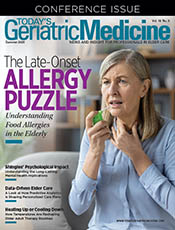
Summer 2025
Summer 2025 Issue Editor’s Note: Staying Cool and Collected The summer season is in full swing, and with it, new challenges and considerations for those working in geriatric care. As warmer months often bring changes in health routines, this issue highlights critical developments reshaping how care is provided for older adults. From recognizing the rise of adult-onset food allergies to leveraging predictive analytics for personalized treatment plans, this issue features timely insights into the evolving landscape of elder care. In our cover story, Stephanie Dunn explores how food allergies are increasingly recognized as a significant and underdiagnosed health issue among older adults. Contrary to the common belief that food allergies are mostly a childhood concern, research shows they can develop or persist later in life. Age-related physiological changes, such as weakened immunity, reduced gastrointestinal function, and overlapping chronic conditions, make diagnosis particularly challenging. With allergies now considered one of the top four chronic diseases by the World Health Organization, and as global populations age, it’s essential that geriatric care providers are prepared to identify, diagnose, and manage food allergies to ensure better health outcomes and quality of life for older patients. In addition, Keith Loria examines how predictive analytics is transforming elder care by enabling more personalized, proactive approaches to managing older adults’ health. By analyzing data from medical records, wearable sensors, and social factors, providers can anticipate risks, close care gaps, and tailor treatment plans. This helps health care workers provide the best care for patients with chronic or complex conditions. This shift from reactive to data-driven care is improving outcomes and quality of life for older adults, particularly in value-based and Medicare-supported care environments. Sue Coyle writes about how shingles, or herpes zoster, affects one in three adults and becomes more common with age, impacting up to 25.8% of individuals over age 90. Caused by reactivation of the varicella-zoster virus (which also causes chickenpox), shingles presents with more severe and lasting symptoms, especially in older adults. Understanding its long-term impact is essential in geriatric care. Other stories examine how changing temperature can often mean a change in care routines, why health care professionals need to remain vigilant in considering the air quality of patients, nutrition’s critical role in long term care and wound healing, fall risk prevention and tips, and how community food programs can make a huge difference in helping older adults. Enjoy the issue! — Chris Baldwin |
